#Introversion and Extraversion
Explore tagged Tumblr posts
Text
"Everybody acts out a myth, but very few people know what their myth is."

Carl Gustav Jung was a Swiss psychiatrist and psychoanalyst who founded analytical psychology.
Born: 26 July 1875, Kesswil, Switzerland
Died: 6 June 1961, Küsnacht, Switzerland
#Carl Jung#Analytical Psychology#Archetypes#Collective Unconscious#Individuation#Persona#Shadow Self#Dream Analysis#Self-discovery#Psychodynamic Theory#Psychological Types#Introversion and Extraversion#Anima and Animus#Synchronicity#Depth Psychology#Symbolism#Mythology#Alchemy#Psyche#Psychological Development#Self-realization#Inner World#Dream Symbols#Jungian Therapy#Inner Self#Ego#Transcendence#Unconscious Mind#Spiritual Growth#Symbolic Imagery
22 notes
·
View notes
Text

The Big 5 Personality Traits: A Framework for Understanding Our Differences
Dive into the Big 5 Personality Traits to gain a better understanding of human personality and individual differences. Discover how characteristics like Openness, Conscientiousness, Extraversion, Agreeableness, and Neuroticism shape who we are and the choices we make in life.
Learn more here!
#psychology#personality#big five#wisdom#mental health#openness#agreeable#relationships#happiness#neuroticism#eq#emotional intelligence#extraversion#introversion#mind
36 notes
·
View notes
Text
"introverts are so stimulated by their own thinking that a roomful of noisy people is just too much for them- it drains their energy."
-susan cain
#introvert#introversion#extravert#extraversion#psychology#susan cain#book quotes#psych#quiet#personality types
9 notes
·
View notes
Text
I will never understand people so interested in themselves. Who basically live a completely introverted life. About themselves... Mysteries mysteries
#I don't believe in introversion or extraversion btw#But will tell u thst ppl overfocused on themselves are so fucking annoying. Introvert blah blah
0 notes
Text
Evidation: My Big 5 Personality Survey Results!
My (former) friend got me onto this app that gives you $10 for 10,000 points that you can turn into money (or donations). This is in exchange for your input for medical studies. You can also tie this to other health apps for extra points!

Before we get any further, I would suggest downloading the app: https://apps.apple.com/us/app/evidation-reward-health/id793039965
This app actually has a lot of perks, so I am shocked as I am writing this how this has not been a tumblr blog sooner. And yet, I will let you discover the multitude of joys on this app. What I am here to talk about is me!
Recently, a couple of personality tests came up for the following areas of one’s personality:
Conscientiousness: Organization, Productiveness, Responsibility
Extraversion: Sociability, Assertiveness, Opposite of Introversion
Agreeableness: Compassion, Respectfulness, Trust in Others
Openness: Intellectual Curiosity, Creative Imagination
Neuroticism: Anxiety and Depression Tendencies
So, part of why I started this blog that has turned into gaming and marketing experimentation was so that one could read my blog and get to know me. So, what are my numbers?
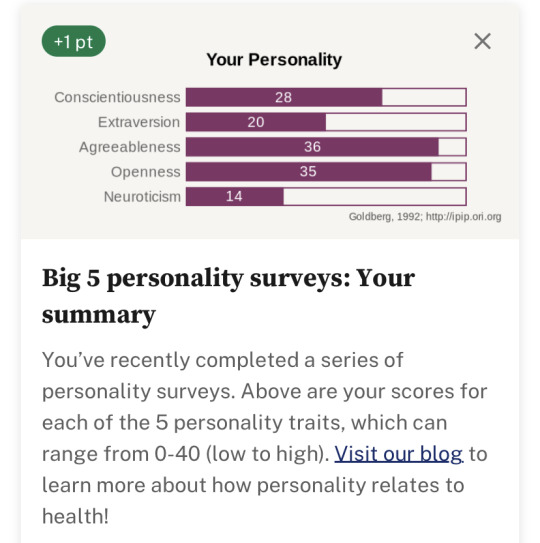
Numbers are just numbers right? Let’s attach some explanation to them:
Conscientiousness (28): Those with high levels of conscientiousness tend to work hard to achieve their goals and complete tasks they’ve started. They also tend to get higher grades in school and perform better in many jobs, but are more likely to experience perfectionism and fear of failure.
Extraversion (20): Those with low levels of extraversion tend to be less social or outgoing. They think carefully before speaking, enjoy time alone or with a few close friends, and are less likely to take part in thrill-seeking activities. If you’re low in extraversion, you may want to focus on keeping up your relationships. Research has found that social relationships may be just as important for a long and healthy life as not smoking, and even more important than being physically active!
Agreeableness (36): Those with high levels of agreeableness tend to be considerate and polite in social interactions. They prefer to resolve conflict by working together or letting things go, and find it easy to trust people and feel compassion towards others. Being higher in agreeableness may relate to a lower likelihood of engaging in risky behaviors, such as drunk driving. You may also be more likely to engage in healthy coping strategies when you’re stressed, such as seeking social support or reframing a stressful situation positively.
Openness (35): Those with high levels of openness are generally open to new activities and ideas. They tend to be creative, curious, and sensitive to art and beauty. If you’re high in openness, and thus enjoy exploring new activities and ideas, you may be more motivated to stick with a varied physical activity schedule than a familiar routine.
Neuroticism (14): Those with low levels of neuroticism may be less likely to experience negative emotions, and might tend to experience more balanced feelings and reactions during stressful situations. Low scorers may also experience a lot of optimism and resilience. Some research suggests that individuals who are low in neuroticism may be less likely to seek medical attention when experiencing symptoms. Make sure you keep up with your doctors’ appointments and have a healthcare provider investigate any new symptoms you may be experiencing.
So, let’s resay this in basic English:
I am a hardworking perfectionist. I don’t keep up with a lot of people but the ones I do keep up with, I am a party and a half. If I don’t know you like that you would not believe it. I am very polite and respectful, and have often been called “The Peace Keeper”. I am great in conversation for having an open mind and love a bit of variety. I work hard to be a positive person, but there are times I don’t worry enough about things.
This is pretty on point. I love this as a self assessment, compared to doing one based on astrology or something more complicated like Meyers Brigg test. Where do you think you would score on each? Have you downloaded the app yet?
#evidation#smart phone#health#apple#personality#conscientiousness#organization#productiveness#responsibility#extraversion#sociability#assertiveness#introversion#rant#about me#agreeableness#compassion#respectfulness#trust#opennes#intellectual curiosity#creative imagination#neuroticism#anxiety#depression#data#medical
1 note
·
View note
Text
Understanding MBTI: A Deep Dive into Personality Types
The Myers-Briggs Type Indicator (MBTI) is a widely recognized and respected psychological tool that helps people understand their personality types. Developed by Katharine Cook Briggs and her daughter Isabel Briggs Myers, MBTI is based on the theories of Swiss psychiatrist Carl Jung. It has been used for decades to help people gain insights into their preferences, strengths, and weaknesses, as…
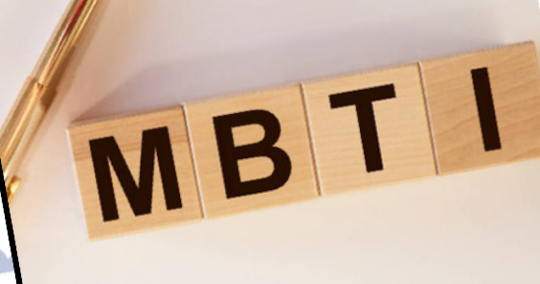
View On WordPress
#Communication#Extraversion#Feeling#Introversion#Intuition#Judging#MBTI#MyersBriggs#Perceiving#PersonalGrowth#PersonalityTypes#Psychology#Relationships#SelfDiscovery#Sensing#Thinking
0 notes
Text
Growing up, my dad seemed to know everyone, and my mom was a vampire bat who rarely left her den 🦇

#extraversion#extravert#introvert#introversion#friends#friend#emo friends#popular#hermit#too many people
3K notes
·
View notes
Text

MBTI Legacy Challenge 16 Generations Inspired by the 16 Myers-Briggs Types
A TS4 Legacy Challenge by @windslar
The MBTI Legacy Challenge is inspired by the Myers-Briggs Type Indicator – a pseudoscientific self-report questionnaire that measures one’s preferences on four dimensions of personality type. The test attempts to assign a value to each of four categories: introversion or extraversion, sensing or intuition, thinking or feeling, and judging or perceiving. One’s four-letter test result represents 1 of 16 possible types. The underlying assumption of MBTI is that each type has specific preferences in the way they interpret their experiences.
This legacy challenge is about diving deeper into the personalities of your sims beyond the limitations of the game. Each type’s preferences underpin their interests, needs, values, and motivation. And in exploring each generation, decisions are made with that particular personality in mind. There are no backstories; rather, there are detailed descriptions and curated lists of aspirations, traits, and careers that are deliberately left open-ended so you can create unique stories. There are also scenarios and prompts specific to each type that affect the lives of your sims in relation to their career, love life, and relationship with their children. No two MBTI Legacy Challenges will ever be the same. This challenge is for players who love structure but also love the freedom to be creative in their gameplay and storytelling.
The official tag for this challenge is #MBTILC
For challenge rules, generation descriptions, and more: GOOGLE DRIVE (this link will save a copy to your drive so you can check off your choices, tasks, etc. so you can have it for personal use) GOOGLE DRIVE (this link will open a view-only copy)
#ts4#the sims 4#ts4 legacy challenge#ts4 challenge#ts4 gameplay#ts4 legacy#mbti#MBTILC#nervous about publishing this#this has been such a labour of love#so i hope people enjoy it!#and someone actually plays it!
971 notes
·
View notes
Text
König MBTI Type

Quick Run Down: The Myers-Briggs Type Indicator (MBTI) personality typing device based on Carl Jung's theory of psychological types. It sorts people into 16 different personality types based on four pairs of opposite traits: Extraversion (E) vs. Introversion (I), Sensing (S) vs. Intuition (N), Thinking (T) vs. Feeling (F), & Judging (J) vs. Perceiving (P)
König is ISTP
Introversion, Sensing, Thinking, Perceiving.

(Fair warning, most of this is ripped straight from mbti sites, w/ minor wording edits from me)
Core Characteristics:
Independent and Self-Reliant: They value their independence and prefer to operate autonomously. ISTPs are often self-sufficient and capable of handling tasks on their own without needing much external support.
Practical and Realistic: They approach challenges with a practical mindset, focusing on finding effective and efficient solutions. They might prefer hands-on methods and immediate fixes rather than theoretical discussions. They favor tangible, factual information over abstract theories. This preference for concrete data helps them feel more grounded.
Practical and Hands-On: ISTPs are highly practical and enjoy working with their hands. They are skilled at understanding how things work and prefer to learn through direct experience rather than theoretical concepts.
Detail-Oriented Focus: When engaging in activities or projects, they pay close attention to the specifics and details. This focus helps them manage tasks effectively but can also lead to heightened stress if things don’t go as planned.
Tendency to Withdraw: When feeling overwhelmed, they may retreat into solitude to process their thoughts and regain composure. This withdrawal helps them recharge and regain a sense of control.
Reserved and Private: They tend to keep their thoughts and feelings to themselves, sharing personal insights only with those they trust deeply. This preference for privacy helps them manage their internal world without external pressures.
In Relationships:
Pros:
Problem-Solving Skills: ISTPs are excellent at tackling problems head-on with a logical and practical approach. In a relationship, this means they often find effective solutions to challenges, making them reliable partners in difficult situations. Their ability to stay calm under pressure can be a grounding force.
Loyalty: Despite their reserved nature, ISTPs are deeply loyal to those they care about. In both romantic and platonic relationships, they’re committed and will go to great lengths to support their loved ones. Their loyalty often creates a strong sense of trust and security.
Adventurous Spirit: ISTPs love new experiences and are often spontaneous, which can make relationships exciting and full of unexpected adventures. They’re the type to surprise you with an impromptu road trip or encourage you to try something new. This keeps the relationship dynamic and engaging.
Self-Reliance: They tend to be very independent and don’t demand constant attention, giving their partners or friends plenty of space. This independence can be refreshing, as they don’t cling to others for validation. It allows for a balanced relationship where both parties can maintain their own identities.
Practical Support: ISTPs are hands-on and often express care through actions rather than words. They’ll fix things, solve problems, or help out in practical ways, making them reliable when it comes to getting things done. This practical support is often appreciated in both romantic and friendship contexts.
Cons:
Emotional Reservedness: ISTPs can struggle to express their emotions, which might leave their partners or friends feeling disconnected or unsure about where they stand. This emotional distance can sometimes be mistaken for a lack of interest or care. It might require patience to navigate their reserved nature.
Difficulty with Open Communication: While ISTPs are great at solving practical problems, they might avoid or downplay issues that involve deeper emotional or relational complexities. This can lead to misunderstandings or unresolved conflicts in the relationship. Partners and friends may find it challenging to get them to open up about their feelings.
Overly Independent: ISTPs often pride themselves on their self-sufficiency, which can make it difficult for them to ask for help or rely on others, even when they need it. This independence can lead to unnecessary struggles, as they might push themselves too hard rather than leaning on their partner or friends. It can also create a sense of distance, as they may not share their challenges, leaving others feeling shut out or unable to support them.
Overly Critical: ISTPs' focus on logic can sometimes make them overly critical or blunt, especially when they feel something isn’t efficient or doesn’t make sense. This can hurt the feelings of those who are more sensitive, even if the ISTP doesn’t intend to cause harm. Their straightforwardness might be misinterpreted as insensitivity.
Need for Alone Time: ISTPs value their alone time highly and might withdraw unexpectedly to recharge, which can be confusing or hurtful to those who don’t understand this need. This withdrawal isn’t a reflection of the relationship’s value but rather a necessity for time alone without any judgment. However, it can create tension if the other person feels neglected.
Risk-Taking Behavior: Their adventurous nature can sometimes lead to impulsive decisions that may cause concern or stress for those around them. This risk-taking behavior can be thrilling but also unpredictable, leading to instability in the relationship. Partners and friends might struggle to keep up with or support their spontaneous actions.

PekoeHoneynCream's Masterlist
53 notes
·
View notes
Text
Writing Notes: Trait Theories

Personality traits reflect people’s characteristic patterns of thoughts, feelings, and behaviors.
Trait theory in psychology rests on the idea that people differ from one another based on the strength and intensity of basic trait dimensions.
3 Criteria that Characterize Personality Traits
consistency,
stability, and
individual differences.
Individuals must be somewhat consistent across situations/settings (e.g., home, work, private life, public persona) in their behaviors related to the trait.
Example: If they are talkative at home, they tend also to be talkative at work.
A trait must also be somewhat stable over time as demonstrated behaviors related to the trait.
Example: At age 30 if someone is talkative they will also tend to be talkative at age 40.
Personality traits will be different from person to person:
People differ from one another on behaviors related to the trait.
People differ on how frequently they talk and so personality traits such as talkative exist.
A major challenge for trait theorists was how to identify traits
They started by generating a list of English adjectives.
Early trait theorists Allport and Odbert identified about 18,000 words in the English language that could describe people (Allport & Odbert, 1936).
The list was later reduced to 4,500 by Allport but even this was far too many traits.
In an effort to make the list of traits more manageable, Raymond Cattell (1946, 1957) narrowed the list to 16 factors and developed a personality assessment called the 16PF.
Later, psychologists Hans and Sybil Eysenck focused on temperament (Eysenck, 1990, 1992; Eysenck and Eysenck, 1963) and hypothesized 2 specific personality dimensions:
extroversion/introversion and
neuroticism/stability.
While Cattell’s 16 factors may be too broad, the 2-factor system proposed by the Eysenck’s has been criticized for being too narrow.
Another personality theory, called the Five Factor Model (FFM), effectively hits a middle ground.
The 5 factors are commonly referred to as the Big Five personality traits (McCrae & Costa, 1987).
It is the most popular theory in personality psychology today and the most accurate approximation of the basic trait dimensions (Funder, 2010).
Traits are scored along a continuum, from high to low rather than present or absent (all or none).
This means that when psychologists talk about Introverts (e.g., quiet, withdrawn, reserved) and Extroverts (e.g., outgoing, social, talkative), they are not really talking about two distinct types of people but rather they are talking about people who score relatively low or relatively high along a continuous dimension.
The 5 Personality Traits
openness to experience,
conscientiousness,
extroversion,
agreeableness, and
neuroticism.
A helpful way to remember the traits is by using the mnemonic OCEAN.
Scores on the Big Five traits are mostly independent which means that a person’s position on the continuum for one trait tells very little about their standing on the other traits.
Examples:
A person can be extremely high in Extraversion and be either high or low on Neuroticism.
A person can be low in Agreeableness and be either high or low in Conscientiousness.
In the FFM you need 5 scores to describe most of an individual’s personality.
Source ⚜ Writing Notes & References
#writing notes#personality#psychology#character development#writeblr#writing reference#dark academia#spilled ink#studyblr#literature#writers on tumblr#writing prompt#poetry#poets on tumblr#creative writing#writing inspiration#writing ideas#light academia#writing inspo#character building#pieter bruegel the elder#art#writing resources
64 notes
·
View notes
Text
I think it is time for me to elaborate on my GETO IS AN INFJ theory.


(more under the cut)
Starting of with what is INFJ?
For people who somehow don't know, INFJ is a personality type according to the Myers-Briggs Type Indicator (MBTI). All of the personality types consist of four letters that mean in sequence: introversion(I)/extraversion(E), sensing(S)/intuition(N), thinking(T)/feeling(F), judging(J)/perceiving(P).
INFJ is a short for Introverted Intuitive Feeling Judging.
People who are INFJ are described as quiet, with strong morals and believes that they are able to fight for. They are guided by principles, and human value is one of the priorities (which, in Geto's case, can be interpreted in two ways - non-sorceres, before he turned evil, and his friends that he wanted to protect, after committing mass murder).
INFJs balance on the border between the humanistic and the strict mind, they have an artistic soul and an analytical mind and they tend to demand a lot from themselves. They may show signs of excessive perfectionism and put more into a task than others expect of them.
Don't tell me it doesn't sound like Geto.
And I'm NOT taking that "he became an INTJ after committing genocide" bullshit. INTJ is more logical, analyzing than INFJ who is, after all, a FEELER so they focus more on their feelings than logical thoughts.




Taking the easiest way and deciding to kill all the non-sorcerers is not logical and Geto knows it (we can see it during his conversation with Shoko when she tells him that he's being childish. He knows no one will understand him and he doesn't expect them to). He's aware that he's doing wrong but he does what his FEELINGS tell him to do.
And now, the most convincing part: satosugu.
Satoru is a 100% ENTP. He walks like an ENTP, he talks like an ENTP, he IS an ENTP.


Even if we look at the memes the "INFJ x ENTP" suit the most for satosugu dynamics. LOOK IT UP.
I'm standing with my INFJ Geto theory 'till the day I die.
#english isn't my first language#so if there's a grammar mistake i am sorry#jjk#jjk gojo#jujutsu kaisen#jjk geto#geto suguru#gojo x geto#jjk satosugu#satosugu#gojo satoru#mbti types#mbti#mbti personalities#mbti personality types#GETO IS AN INFJ#jjk fandom
112 notes
·
View notes
Text
Your MBTI, Your Relationship With JJK Characters Final Part 8
ENTJ / ESTJ
you can find all parts here
a/n: Omg can't believe this is the last part of MBTI series, I'm glad that you enjoyed it and thank y'all for your requests 🫶🏻❤️. Thank you @deluluforcarlos55 for requesting ENTJ, also thank you @suchasecretiveninja for reading and being interested in all parts.

ENTJ
Ryomen Sukuna = Desires you
Your smart, ambitious and creative nature is a big turn on for Sukuna. He wants to use your qualities and strengths for his own advantage that's why he strongly desires to have and own you. ENTJs have a gift in achieving their goals easily without too much effort or stress. They are strong-willed with strategic thinking that makes them always a step ahead from others, that's exactly what's Sukuna needs. He likes challenges, so when his desire to control you is faced with your strong resistance, he would definitely turn it into a playful game of tag. He enjoys the thrill of hunting you down on his journey of making you his. ENTJs are known for their high sense of autonomy, so the more you resist Sukuna, the more he would get obsessed with you.
Geto Suguru = Husband.
A powerful couple respected and feared by everyone. Both driven by your desire for achievements and success. Despite being married you're still each other's best partners in business, working together to reach mutual goals. You heavily rely on each other in mostly everything. You're assertiveness compliment Suguru's smart planning. ENTJs has a high standard in men and Geto definitely met your expectations. You rarely have arguments in your relationship since both of you are good at problem solving without inserting too much feelings. Even though you too find it hard or rather afraid to open up you still try to be more open and show your weaknesses since you have protective sense towards each other. When you get extremely comfortable and in a goofy mood, you would act really extra but in a classy way.
Yuuji Itadori= A good friend
A source of motivation that's what you are to Yuuji. There's something in ENTJ that observes people, sees the potential in them and literally push them forward to master those skills. It's a big ick for them to see a wasted potential. ENTJs are fast learners with high intellect so they have no patience for slow and inefficient people, luckily Yuuji is a good match. His will to learn and better himself and his skills brought you together. You respect that kind of people; those workaholic who don't give up easily. Your different personality aspects moderate your relationship; he teaches you how to be more empathetic, grounded and you teach him how to be logical, prudent and sharp.
ESTJ
Toji Fushiguro= Boyfriend
A harmonious blend of extraversion and introversion but with mutual values. ESTJ enjoys being the center of attention, too focused on social status; something that Toji finds extremely attractive. You contribute to an organized relationship since ESTJs tend to be excellent organizers.Toji's rationality allows him to suit your personality, both of you are highly thinking individuals with judgmental sides. Two peas in a pot that's what you are. Both of you know exactly what you want from the relationship, also are brutally honest, luckily your self-confidence protects you from being offended. Toji is into the bratty type, so ESTJ would definitely be his type with your bossy and stubborn demeanor.
Megumi Fushiguro = Friend
You rely on each other, Megumi literally would trust you with his life. ESTJs are gifted with a natural sense of leadership that makes everyone around count on them. You bring structure and order to the group, that's something similar in Megumi's persona. Both of you have a difficulty to vocalize your emotions and feelings but your actions speak volumes making your friendship even stronger. Your friendship is balanced; Megumi is an introverted person with a calm demeanor so handling some complicated social situations might be hard for him so having an ESTJ friend would make it way easier for him. With your outgoing nature, you'd would take charge of those social energy draining settings. Overall you have a trustworthy, stable bond
Mahito = Enemy
ESTJs thrive in organize and structured environment, guided by strict rules, so having someone who tends to violate this harmony and chooses to be rebellious and inclines from following certain guidelines is considered a threat for the well established order that you set. To ESTJ, Mahito is a troublemaker, an individual that would only cause chaos and anarchy. Mahito's personality clashes with ESTJ authoritarian and controlling nature; creating and enmity and tension between you. Mahito's weapon is to try to spoil your plans and to-do list ,this would be faced with a negative and brutal reaction from you.
#jujutsu kaisen#jujutsu kaisen masterlist#jujutsu kaisen headcanons#jujutsu kaisen imagines#jujutsu kaisen x reader#sukuna headcanons#toji headcanons#mbti personalities#mbti personality types#mbti types#mbti#jujutsu kaisen smut#jjk angst#jjk fluff#jjk smut#jjk men#nanami headcanons#toji x reader#geto suguru headcanons#ryomen sukuna x reader#megumi headcanons#yuji headcanons#gojo satoru headcanons#sukuna x reader#sukuna x you#geto x reader#geto x y/n#jjk x reader#jjk x y/n#jjk x you
71 notes
·
View notes
Text
An Introvert's Guide to Winning
If you are like me who is an INTJ-T is seems like the world is not your oyster. in fact, the idea that fortune favors the brave still makes you ponder. Does that mean that if I am not brave enough, I won't be fortunate? Now imagine being an introvert who is also shy. Here are ways to win as an introvert.
Take advantage of your introversion and be a great observer. As someone who grew up shy and introverted it was hard to see my friends winning. Most introverts stay away from large crowds, they prefer smaller intimate settings and if they are socially awkward it's harder. So here is what I do, I go to a large crowd and watch people, I look at everyones body language, I walk around like I am looking for someone then I pause in awe of how good looking many of them are and how lucky I am. Then I approach the people who look shy or do not have anyone to talk to and I begin asking them questions and find similarities. Being an introvert means you spend more time in your thoughts but what are you thinking? Think in awe and approach a person based on that. It is not about how many people you can talk to but the quality of conversations you have. often times you become lit because you have found someone who thinks just like you and that makes other people want to pitch into that fun conversation that you have.
Fine tune your body language and style: So, you are invited to your bosses birthday and you have turned down many outings but you don't want to disappoint your boss by not going. So, you decide to show up. But how do you show up? You will show up looking your best, put your best foot forward and radiate the energy that is within you. Often times other people will gravitate towards you or the host might introduce you to other people.
Take the road less traveled: If you are afraid of not having a talking partner, look for other guests who do not have talking partners or look shy. They are easier to approach, so engage them by asking open ended question, show interest, and make them feel very comfortable around you. This has happened to me several times. I would go to an event and be on the lookout for the oldest person in the room that is often ignored or that person that is by the corner in the dark and illuminate their minds with my quiet extraversion.
Be a great storyteller: I do not speak loudly or know everyone in an area. I get tired quickly when I am out and about so I try to give a great story about myself or a random thing that I saw in the mst imaginative, enticing, and romantic way possible. Making the listener feel special about the conversation.
Bring the best in you: Being great at what you do will make people speak of you in rooms you never dreamed of getting into. I was recently introduced to the European Union Deputy General of Trade by my Negotiations professor because he considered me one of his brightest students and gave me an invite to the conference the diplomat attended (I was the only student in the room).
Capitalize on 1 on 1s: See opportunities to be alone with someones as a time for you to shine. During interviews be elated that this person has chosen to spend time getting to know only you. So this is your time to show off the personality that you have been hiding from the world.
#self improvement#self love#beauty#growth#mindfulness#self development#classy#get motivated#mindset#mind control#motivation#meditation#emotional intelligence#intelligent#interesting#improve#ideas#intellectual#students#smart#high culture#self care
328 notes
·
View notes
Text
Navigation
Tony Stark’s achievements
(NEW) Tony's real Alter Ego
Tony's self-esteem:
Self-esteem poll
About High Self-esteem and Absurdity
Tony and ambition
(NEW) 616 Tony
Proofs:
(IMPORTANT) Tony is not an extravert (+616 Tony)
Tony is bisexual in the MCU
Tony is a Sub in the MCU
Tony is not an alcoholic in the MCU
Tony's childhood & education:
(NEW) Bravery
(NEW) Inner Child
(NEW) Own Will
(NEW) Facts about his childhood
Doctor Stark
Tony and Rhodey
Billionaire Tony...:
Likes simple things...
Does things like...
(NEW) Doesn't have...
The AoU scenes
He's the guy who...
Doing chores
Can't cook but doesn't have a chef
Despises comfort
Avengers Compound Owner
Tony's masks:
"I'm fine" mask
Infinity War and Endgame examples
SM Homecoming examples
Civil War examples
Age of Ultron examples
Iron Man 3 examples
The Avengers examples
Iron Man 2 examples
Iron Man (2008) examples
Tony's introversion:
Extraversion-Introversion poll
Socially awkward Tony
Absent-minded Tony
Video:
"Our Brave Father" by Next Gen Media
"Unstoppable" (describes Tony perfectly in just 3 mins)
Good boy Tony:
Poll (Tony Stark as an animal)
Why he is a dog
Saint Bernard
Cat person
Miscellaneous:
(NEW) Marksman
(NEW) Happy with kids
Happy doing Science
Tony without a suit or armor
"Playboy" Tony
Tony Stark is a Gryffindor
Captain Morgan
AU idea - pediatrician Tony
FrostIron in What If?
Opinions vs Truth
About Characters in the Multiverse
Perfect Character
"Favorite ship" poll
RDJ and Schubert in The Avengers
RDJ's Best Performance
RDJ’s Oscar snub in 2010
About genre discrimination and art
About “Real movies” and Art again
Why Bucky is not the new Captain America
Priority of Information Sources
Iron Man & Christopher Nolan
War and Peace
About Hypocrisy
X (Easter egg?)
Howard Stark
Boop
And nothing else
Alert
(NEW) Living in a world of superheroes and supervillains (if you're an ordinary person)
"Clint Barton has no superpowers"
(NEW) Tony Stark = Garrus Vakarian
Review of anti-Tony statements:
(NEW) Tony and inappropriate jokes
(NEW) Tony is not a womanizer
About Haters and Lovers
(NEW) For those who missed the villain in IM1
(NEW) Ratification of The Sokovia Accords
War Crimes
(NEW) Recruiting Peter in Civil War: a War Crime?
(NEW) Recruiting Peter in Civil War: Tony blackmailed him?
(NEW) Recruiting Peter in Civil War: Tony wanted Peter to fight battles for him?
Part 7 (Peter's PJ in Homecoming)
Part 6 (Tony vs Rogers & Barnes in Civil War 2)
Part 5 (portal in The Avengers)
Part 4 (Tony saving Steve in The Avengers)
Part 3 (Tony and time travel 2)
Part 2 (Tony and time travel 1)
Part 1 (Tony vs Rogers & Barnes in Civil War 1)
#tony stark#iron man#mcu#marvel#the avengers#avengers endgame#captain america civil war#avengers age of ultron#iron man 2#iron man 3#avengers infinity war#spider man homecoming#robert downey jr#rdj
33 notes
·
View notes
Text
Myers-Briggs Type Indicator
ISTJ - The Inspector
ISFJ - The Protector
INFJ - The Counselor
INTJ - The Mastermind
ISTP - The Craftsman
ISFP - The Composer
INFP - The Healer
INTP - The Architect
ESTP - The Dynamo
ESFP - The Performer
ENFP - The Champion
ENTP - The Visionary
ESTJ - The Supervisor
ESFJ - The Provider
ENFJ - The Teacher
ENTJ - The Commander
E - Extraversion X I - Introversion
E (Extraversion): Indicates a preference for focusing on the outer world, gaining energy from social interactions, and being more outgoing.
I (Introversion): Represents a preference for focusing on the inner world, gaining energy from solitude, and being more reserved.
S - Sensing X N - Intuition
S (Sensing): Reflects a preference for gathering information through the five senses, focusing on concrete details, and being practical and realistic.
N (Intuition): Reflects a preference for gathering information through patterns, possibilities, and abstract concepts, focusing on the big picture and future possibilities.
T - Thinking X F - Feeling
T (Thinking): Indicates a preference for making decisions based on logic, objective analysis, and rational criteria.
F (Feeling): Indicates a preference for making decisions based on personal values, emotions, and consideration of the impact on relationships.
J - Judging X P - Perceiving
J (Judging): Suggests a preference for a structured, organized lifestyle, making decisions and planning ahead.
P (Perceiving): Suggests a preference for a flexible, spontaneous lifestyle, adapting to situations as they arise.
#personality#writing personality#writing characters#myers briggs#paper's thoughts#just my attempt to understand this mess#if i see one more person calling my fav character a butch of letters I'd just ???????
93 notes
·
View notes
Text
Some HL characters & their MBTI types
(headcanons)
A/N: When I create an OC for my fanfics, I like to give them an MBTI profile (it's a fun way of exploring a fraction of the character's personality) and imagine those of characters from the fandom. So here are the ones I imagine for a few characters from Hogwarts Legacy. 💚
Obviously, these are just headcanons, you're free to have others. 😊
Sebastian Sallow

the Entertainer / the Performer
ESFP => Extraversion, Sensing, Feeling, Perception
Strengths: bold, original, creative, practical, observant, talkative, witty
Weaknesses: sensible, emotional, risky behavior, self-indulgence, they rarely bother with taking the time to lay out steps and consequences
Anne Sallow

The Aventurer or the Composer
ISFP => Introversion, Sensing, Feeling, Perception
Strengths: charming, sensitive of others, passionate, curious, bold, spontaneous
Weaknesses: fiercely independent, overly competitive, easily bored
A/N: In twins, one is often extraverted and the other introverted.
Solomon Sallow

the Executive or the Director
ESTJ => Extraversion, Sensing, Thinking, Judgment
Strengths: dedicated, strong-willed, direct, honest, loyal, patient, enjoy creating order
Weaknesses: inflexible, stubborn, judmental, difficulty to relax, difficulty to expressing emotion
Ominis Gaunt
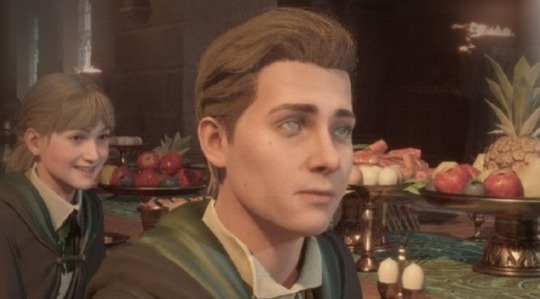
the Logistician or the Inspector
ISTJ => Introversion, Sensing, Thinking, Judgment
Strengths: honest, direct, strong-willed, dutiful, responsible, calm, practical, enforce order
Weaknesses: stubborn, judgmental, often unreasonably blame themselves, Not intentionally harsh, but his direct honesty makes him hurtful
A/N: ESFP (Sebastian) and ISTJ work well as friends or lovers 💚
Garreth Weasley

the Debater or the Visionary
ENTP =>Extraversion, iNtuition, Thinking, Perception
Strengths: Knowledgeable, quick thinkers, original, bold, charismatic, energetic, sense of humour
Weaknesses: argumentative, can find it difficult to focus, likes to break the rules, incorrigible, stubborn
Natsai Onai

The Aventurer or the Composer
ISFP => Introversion, Sensing, Feeling, Perception
Strengths: charming, sensitive of others, passionate, curious, bold, spontaneous
Weaknesses: fiercely independent, overly competitive, easily bored
Leander Prewett

The Protagonist or the Teacher
ENFJ => Extraversion, iNtuition, Feeling, Judgment
Strengths: receptive, reliable, passionate, leader, persuasive
Weaknesses: unrealistic, condescending, intense, headstrong
Amit Thakkar

the Logician or the Architect
INTP => Introversion, iNtuition, Thinking, Perception
Strengths: Analytical, original, open-minded, curious, objective
Weaknesses: disconnected, may appear insensitive, dissatisfied, perfectionistic, incertainty
Poppy Sweeting
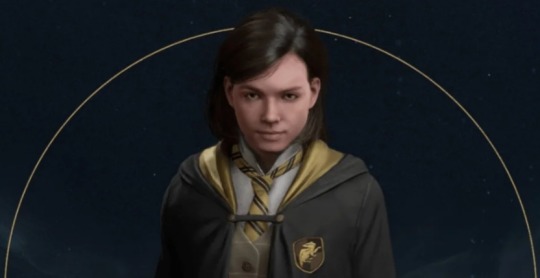
the Mediator or the Healer
INFP => Introversion, iNtuition, Feeling, Perception
Strengths: empathetic, generous, open-minded, creative, passionate, idealistic
Weaknesses: unrealistic, self-isolating, emotionally vulnerable, self-critical.
Mirabel Garlick
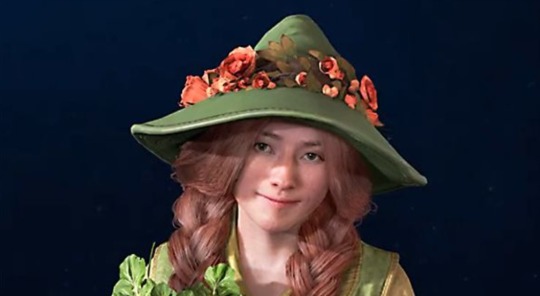
The Compainer or the Champion
ENFP => Extraversion, iNtuition, Feeling, Perception
Strengths: openhearted, open-minded, curious, perceptive, enthousiastic, festive, good-natured, strong social conscience
Weaknesses: hypersensitive, overemotional and approval-seeking, overly accommodating, overly optimistic, restless,
A/N: If I haven't thought about other MBTI profiles, it's simply because I haven't yet had any use for them in my fanworks.💚
#hogwarts legacy#hogwarts legacy headcanons#sebastian sallow#ominis gaunt#anne sallow#solomon sallow#Ominis gaunt#garreth weasley#leander prewett#natsai onai#poppy sweeting#amit thakkar#mirabel garlick#mbti
84 notes
·
View notes